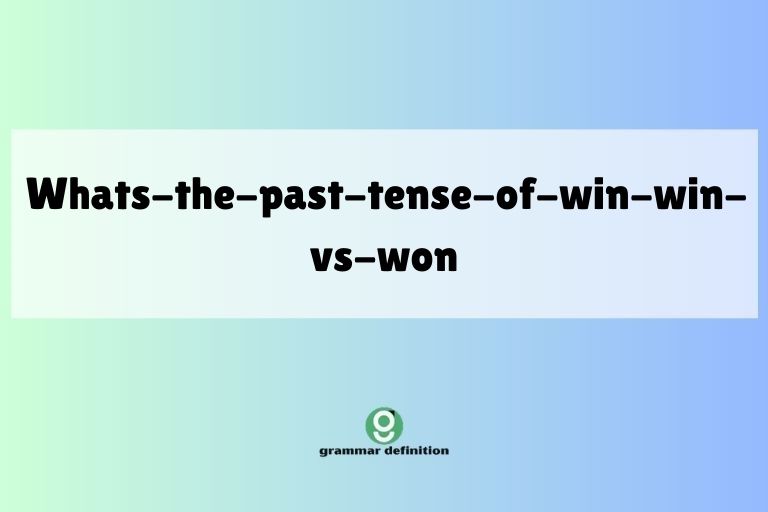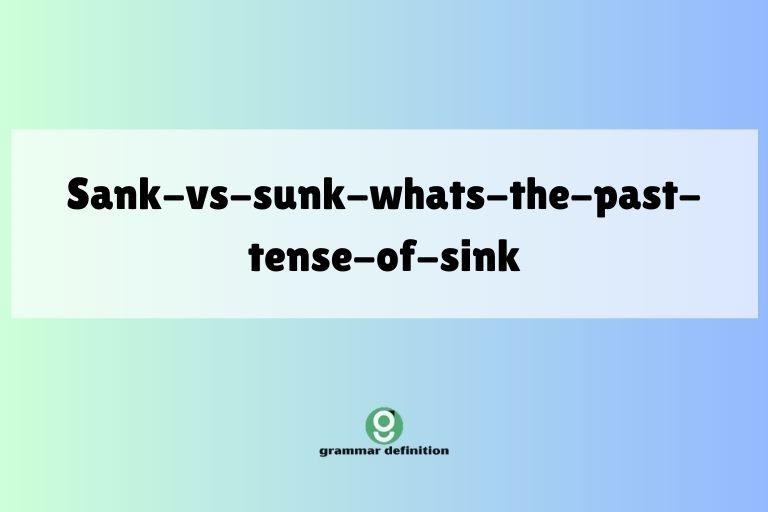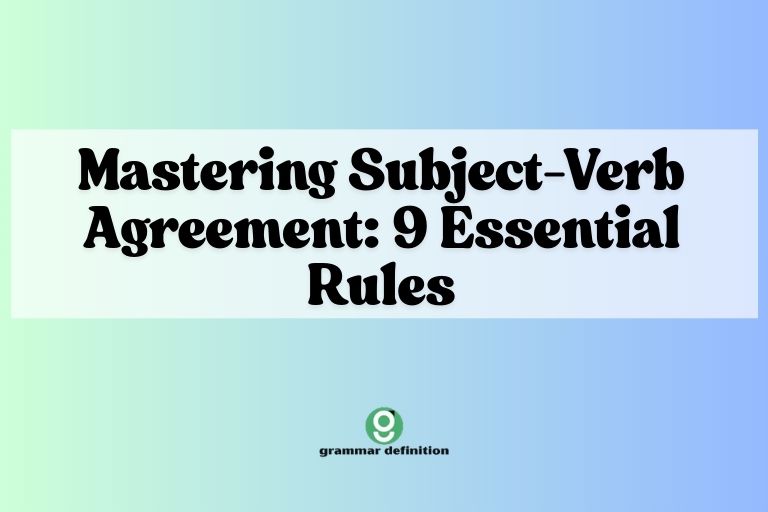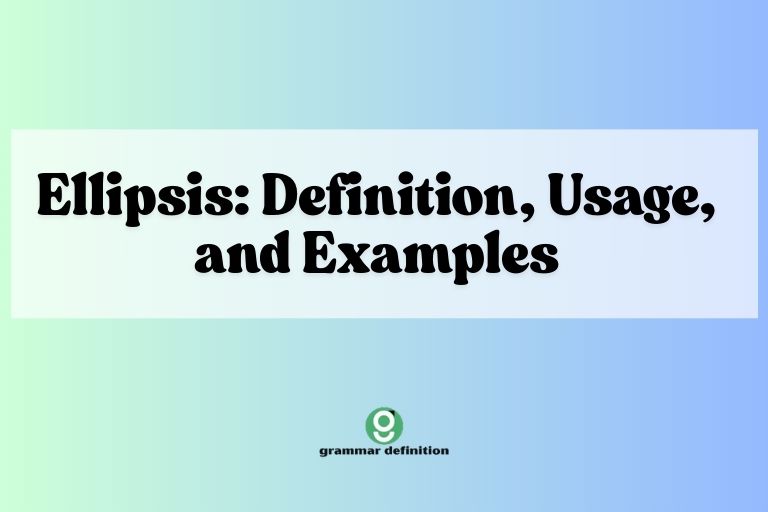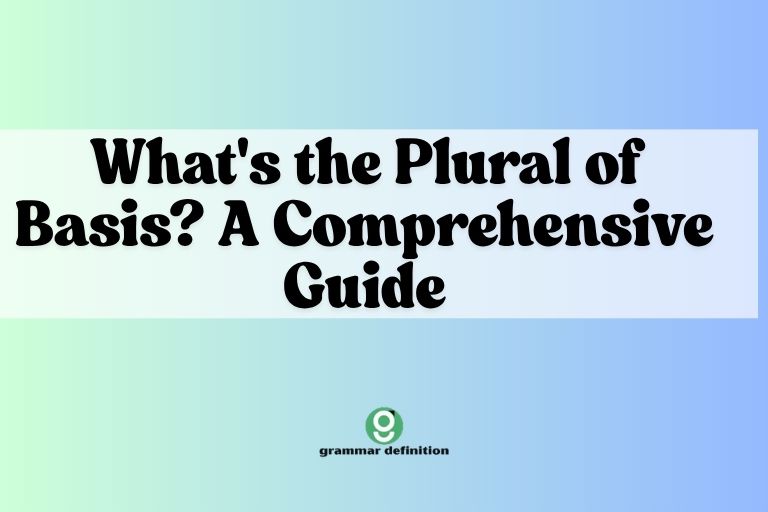Commonly Confused Words in English: A Comprehensive Guide
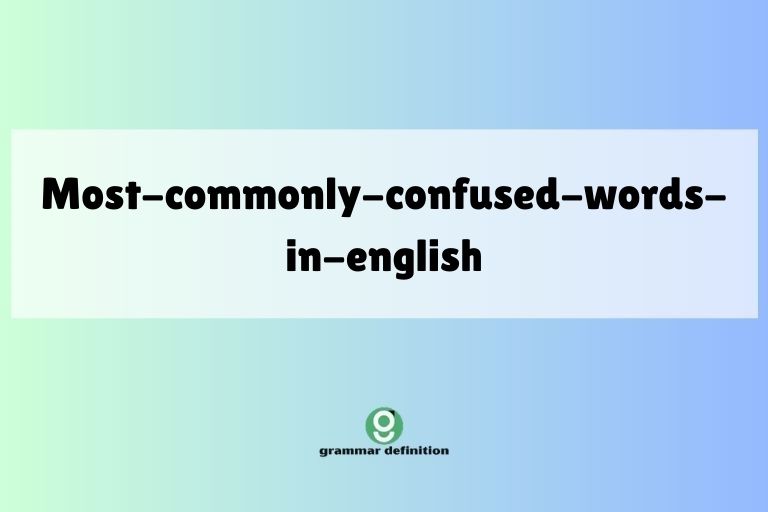
Mastering English involves more than just learning vocabulary and grammar rules; it also requires understanding the subtle differences between words that sound or look alike but have distinct meanings. These commonly confused words can trip up even advanced learners, leading to miscommunications and errors in writing.
This guide offers a detailed exploration of these tricky words, providing clear definitions, examples, and practice exercises to help you confidently navigate the nuances of the English language. Whether you are a student, a professional, or simply an English enthusiast, this article will enhance your understanding and improve your accuracy in both written and spoken communication.
Table of Contents
- Introduction
- Definition of Commonly Confused Words
- Structural Breakdown
- Types and Categories
- Examples
- Usage Rules
- Common Mistakes
- Practice Exercises
- Advanced Topics
- FAQ
- Conclusion
Definition of Commonly Confused Words
Commonly confused words are words in the English language that are often mistaken for each other due to similarities in spelling, pronunciation, or both. These words can have entirely different meanings, and using them incorrectly can lead to confusion or misinterpretation.
Understanding the distinctions between these words is crucial for clear and effective communication.
These words can be classified based on various linguistic phenomena, including phonetics (sound), orthography (spelling), and semantics (meaning). Recognizing these classifications helps to understand why these confusions occur and how to avoid them.
Structural Breakdown
The structural similarity of commonly confused words often contributes to the errors in their usage. This similarity can manifest in various ways:
- Spelling: Words that have very similar spellings, differing by only one or two letters, are a frequent source of confusion. For example, “accept” and “except.”
- Pronunciation: Words that sound alike, or nearly alike, are easily mixed up, especially in spoken or quickly written communication. “There,” “their,” and “they’re” are a classic example.
- Root words: Words derived from the same root but with different prefixes or suffixes can have related but distinct meanings, leading to confusion. “Affect” and “effect” share a Latin root but function differently in sentences.
Understanding the structural relationships between these words can help you to remember their correct usage. Paying attention to the specific letters, sounds, and word origins can provide valuable clues to their meanings.
Types and Categories
Commonly confused words can be categorized into several types based on their linguistic properties:
Homophones
Homophones are words that sound the same but have different meanings and spellings. These are among the most frequently confused words in English.
Homographs
Homographs are words that have the same spelling but different meanings and sometimes different pronunciations. For example, “lead” (to guide) and “lead” (the metal).
Homonyms
Homonyms are words that share the same spelling and pronunciation but have different meanings. Homonyms are a subset of both homophones and homographs. An example is “bank” (financial institution) and “bank” (river bank).
Capitonyms
Capitonyms are words that change their meaning when capitalized. For example, “polish” (to make shiny) and “Polish” (relating to Poland).
Look-Alike Words
Look-alike words are words that have similar spellings and may or may not have similar pronunciations, but have different meanings. These words often cause confusion in writing due to their visual similarity.
Examples
To better understand the nuances of commonly confused words, let’s look at some specific examples in each category.
Affect vs. Effect
Affect is typically used as a verb, meaning to influence or produce a change in something. Effect is typically used as a noun, meaning a result or consequence. However, “effect” can also be used as a verb meaning to bring about or accomplish, and “affect” can be used as a noun in psychology, referring to emotion or feeling.
The table below shows examples of how to use affect and effect correctly in sentences:
| Word | Part of Speech | Definition | Example Sentence |
|---|---|---|---|
| Affect | Verb | To influence | The weather can affect my mood. |
| Effect | Noun | A result or consequence | The effect of the rain was widespread flooding. |
| Effect | Verb | To bring about | The new regulations will effect significant changes. |
| Affect | Noun | (Psychology) Emotion or feeling | The patient displayed a flat affect during the session. |
| Affect | Verb | To pretend to have or feel something. | She affected an air of indifference, though she was secretly thrilled. |
| Effect | Noun | A visual or auditory impression | The movie’s special effects were stunning. |
| Affect | Verb | To attack or infect | The disease can affect the liver. |
| Effect | Noun | The power to produce a result | The medicine had a positive effect on his health. |
| Affect | Verb | To move someone emotionally | The sad story affected her deeply. |
| Effect | Noun | A scientific law or phenomenon | The Doppler effect explains the change in frequency of sound waves. |
| Affect | Verb | To use or wear something as if it is natural or usual | He affected a British accent despite being American. |
| Effect | Noun | Personal belongings | After the fire, they gathered their personal effects. |
| Affect | Verb | To adopt a particular style or mannerism | She affected a bohemian style. |
| Effect | Noun | The state of being operative or valid | The new law went into effect on January 1st. |
| Affect | Verb | To consume or make use of something | The company’s decisions will affect everyone. |
| Effect | Noun | The impression produced on the mind or senses | The overall effect of the painting was breathtaking. |
| Affect | Verb | To pretend to have a feeling, appearance, or habit | He affected not to notice her entrance. |
| Effect | Noun | The capacity or power to produce a desired result | The treatment had little effect on the disease. |
| Affect | Verb | To cause someone to feel sad or sympathetic | The news affected him deeply. |
| Effect | Noun | The realization of something desired or anticipated | The plan was put into effect immediately. |
| Affect | Verb | To make a display of (something) | He affected a nonchalant attitude. |
| Effect | Noun | A particular state or condition | The medication had a calming effect on her. |
| Affect | Verb | To deal with or use something | The new policy will affect all employees. |
| Effect | Noun | A scientifically verifiable phenomenon | The placebo effect can sometimes be quite powerful. |
| Affect | Verb | To be connected to or have a bearing on | The decision will affect the future of the company. |
| Effect | Noun | The ability to influence events | Her speech had a profound effect on the audience. |
There, Their, and They’re
There indicates a place or position. Their shows possession. They’re is a contraction of “they are.”
The table below shows examples of how to use there, their, and they’re correctly in sentences:
| Word | Definition | Example Sentence |
|---|---|---|
| There | A place or position | The book is over there. |
| Their | Possessive form of “they” | Their house is very big. |
| They’re | Contraction of “they are” | They’re going to the park. |
| There | Used to indicate existence | There is no milk in the fridge. |
| Their | Belonging to them | The students handed in their assignments. |
| They’re | Expressing a future action | They’re planning a vacation next month. |
| There | Used in exclamations | There, I told you so! |
| Their | Indicating a relationship | Their parents are coming to visit. |
| They’re | Describing a current state | They’re happy to be here. |
| There | Introducing a subject | There once was a king. |
| Their | Referring to a group | Their team won the championship. |
| They’re | Indicating an ongoing process | They’re working on a new project. |
| There | Referring to a condition or situation | There seems to be a problem. |
| Their | Indicating origin | Their products are made in Italy. |
| They’re | Expressing a belief or opinion | They’re convinced they can succeed. |
| There | Used for emphasis | Right there is where I found it. |
| Their | Possessing a quality | Their kindness is appreciated. |
| They’re | Indicating a future possibility | They’re likely to arrive late. |
| There | Used to point out something | Look over there! |
| Their | Referring to a shared experience | Their journey was long and difficult. |
| They’re | Describing a feeling or emotion | They’re excited about the news. |
| There | Used to express agreement | There, that’s better. |
| Their | Indicating a common goal | Their mission is to help others. |
| They’re | Indicating a future intention | They’re determined to succeed. |
| There | Used to introduce a fact | There is no doubt about it. |
| Their | Referring to a unique identity | Their culture is rich and diverse. |
To, Too, and Two
To is a preposition or part of an infinitive verb. Too means also or excessively. Two is the number 2.
The table below shows examples of how to use to, too, and two correctly in sentences:
| Word | Definition | Example Sentence |
|---|---|---|
| To | Preposition | I am going to the store. |
| Too | Also, excessively | I want to go too. It’s too hot outside. |
| Two | The number 2 | I have two apples. |
| To | Infinitive marker | I need to study for the exam. |
| Too | In addition | She brought a gift for me, and one for you too. |
| Two | A pair of things | We need two tickets for the show. |
| To | Expressing direction | They drove to the beach. |
| Too | More than enough | The music was too loud. |
| Two | Referring to a division | Divide the cake into two pieces. |
| To | Indicating a relationship | This gift is from me to you. |
| Too | To a great extent | He was too tired to continue. |
| Two | Representing a duality | There are two sides to every story. |
| To | Expressing purpose | I went to the library to read. |
| Too | Also applicable | That rule applies to me too. |
| Two | Used in calculations | One plus one equals two. |
| To | Indicating a limit | He worked from nine to five. |
| Too | Beyond what is necessary | The soup was too salty. |
| Two | Referring to a combination | We make a great two. |
| To | Expressing obligation | You have to finish your homework. |
| Too | More than is suitable | The dress was too expensive. |
| Two | Used in measurements | The table is two meters long. |
| To | Indicating a destination | We are flying to Paris. |
| Too | In an excessive manner | He ate too much cake. |
| Two | Referring to an age | She is two years old. |
Its vs. It’s
Its is the possessive form of “it.” It’s is a contraction of “it is” or “it has.”
The table below shows examples of how to use its and it’s correctly in sentences:
| Word | Definition | Example Sentence |
|---|---|---|
| Its | Possessive form of “it” | The dog wagged its tail. |
| It’s | Contraction of “it is” or “it has” | It’s a beautiful day. It’s been a long time. |
| Its | Belonging to it | The company announced its new policy. |
| It’s | Expressing a condition | It’s important to stay hydrated. |
| Its | Referring to an object | The car had its tires changed. |
| It’s | Indicating a quality | It’s impressive how well she sings. |
| Its | Indicating a feature | The building is known for its architecture. |
| It’s | Describing a situation | It’s raining outside. |
| Its | Referring to an animal | The cat licked its paws. |
| It’s | Expressing a time | It’s time to go home. |
| Its | Indicating a purpose | The project achieved its goal. |
| It’s | Indicating a possibility | It’s possible that we will win. |
| Its | Referring to a place | The city is famous for its landmarks. |
| It’s | Expressing a belief | It’s believed that he is innocent. |
| Its | Indicating a success | The team celebrated its victory. |
| It’s | Describing a feeling | It’s wonderful to see you. |
| Its | Referring to a process | The company is reviewing its procedures. |
| It’s | Indicating a preference | It’s my favorite song. |
| Its | Indicating a characteristic | The product is known for its durability. |
| It’s | Expressing a potential | It’s a great opportunity. |
Than vs. Then
Than is used for comparisons. Then indicates time or sequence.
The table below shows examples of how to use than and then correctly in sentences:
| Word | Definition | Example Sentence |
|---|---|---|
| Than | Used for comparisons | She is taller than her brother. |
| Then | Indicating time or sequence | I went to the store, then I went home. |
| Than | Expressing a preference | I would rather stay home than go out. |
| Then | Indicating consequence | If you study hard, then you will pass the exam. |
| Than | Used in measurements | The room is larger than I expected. |
| Then | Referring to a specific time | Back then, things were different. |
| Than | Expressing a degree | He is more experienced than she is. |
| Then | Indicating a next step | First, add the flour, then mix it well. |
| Than | Used in proportions | More people prefer coffee than tea. |
| Then | Expressing a condition | Only then did I realize my mistake. |
| Than | Expressing a difference | The movie was better than the book. |
| Then | Indicating a logical consequence | If that’s the case, then we should leave. |
| Than | Used in comparisons of quantity | I have less money than you. |
| Then | Referring to a past time | I was living in New York back then. |
| Than | Expressing a ratio | The chances are higher than ever before. |
| Then | Indicating an immediate sequence | He sat down, and then he began to read. |
| Than | Used to show superiority | This car is faster than that one. |
| Then | Expressing a conclusion | So, then, what should we do? |
| Than | Expressing an alternative | I would rather walk than take the bus. |
Usage Rules
Understanding the usage rules for commonly confused words is crucial to avoid errors. Here are some general guidelines:
- Pay attention to context: The surrounding words and the overall meaning of the sentence often provide clues to the correct word choice.
- Memorize definitions: Having a clear understanding of each word’s meaning is essential.
- Use mnemonic devices: Create memory aids to help you remember the differences between the words.
- Practice regularly: The more you practice using these words correctly, the easier it will become.
- Proofread carefully: Always double-check your writing for errors, paying close attention to commonly confused words.
For example, when deciding between “affect” and “effect,” remember that affect is usually a verb (action) and effect is usually a noun (result). If you need a verb, “affect” is likely the correct choice. If you need a noun, “effect” is more appropriate.
Common Mistakes
Even experienced English speakers sometimes make mistakes with commonly confused words. Here are some frequent errors and their corrections:
- Incorrect: The medicine had a strong affect on his health. Correct: The medicine had a strong effect on his health.
- Incorrect: Their going to the party tonight. Correct: They’re going to the party tonight.
- Incorrect: I want to go to, but I am two tired. Correct: I want too go too, but I am too tired.
- Incorrect: The cat cleaned it’s paws. Correct: The cat cleaned its paws.
- Incorrect: I ate dinner, than I watched TV. Correct: I ate dinner, then I watched TV.
By recognizing these common errors, you can be more vigilant in avoiding them in your own writing and speech.
Practice Exercises
Test your understanding of commonly confused words with the following exercises.
Exercise 1
Choose the correct word in the parentheses to complete each sentence.
- The new law will (affect/effect) many people.
- (There/Their/They’re) going to visit (there/their/they’re) grandparents.
- I want (to/too/two) go (to/too/two) the park with you.
- The dog wagged (its/it’s) tail excitedly.
- She is taller (than/then) her brother.
- The (affect/effect) of the storm was devastating.
- (There/Their/They’re) car is parked over (there/their/they’re).
- I have (to/too/two) many books (to/too/two) read.
- (Its/It’s) a beautiful day to go for a walk.
- I ate dinner, (than/then) I went to bed.
Answers:
- affect
- They’re, their
- to, too
- its
- than
- effect
- Their, there
- too, to
- It’s
- then
Exercise 2
Fill in the blank with the correct word (affect, effect, there, their, they’re, to, too, two, its, it’s, than, then).
- The movie had a profound ________ on me.
- ________ house is the one with the blue door.
- ________ late for the meeting.
- The company announced ________ new policy.
- I would rather have coffee ________ tea.
- The pollution will ________ the environment.
- If you finish your homework, ________ you can watch TV.
- He gave me ________ apples.
- ________ is no one here.
- ________ my favorite restaurant.
Answers:
- effect
- Their
- They’re
- its
- than
- affect
- then
- two
- There
- It’s
Exercise 3
Correct the sentences below, identifying the misused word and providing the correct alternative.
- The affect of the new policy was unexpected.
- Their going to the beach tomorrow.
- I want to go to, but I’m to tired.
- Its a beautiful day to go for a walk.
- Than he went to the store.
- They’re dog is very friendly.
- There is too many people here.
- Its tail was wagging excitedly.
- To plus to equals four.
- I am taller then my sister.
Answers:
- The affect of the new policy was unexpected. Corrected: The effect of the new policy was unexpected.
- Their going to the beach tomorrow. Corrected: They’re going to the beach tomorrow.
- I want to go to, but I’m to tired. Corrected: I want to go too, but I’m too tired.
- Its a beautiful day to go for a walk. Corrected: It’s a beautiful day to go for a walk.
- Than he went to the store. Corrected: Then he went to the store.
- They’re dog is very friendly. Corrected: Their dog is very friendly.
- There is too many people here. Corrected: There are too many people here.
- Its tail was wagging excitedly. Corrected: Its tail was wagging excitedly.
- To plus to equals four. Corrected: Two plus two equals four.
- I am taller then my sister. Corrected: I am taller than my sister.
Advanced Topics
For advanced learners, it’s helpful to understand the etymology and historical context of commonly confused words. For instance, the words “insure” and “ensure” are often used interchangeably, but they have distinct origins and connotations.
“Insure” typically refers to protecting against financial loss, while “ensure” means to make certain or guarantee.
Another advanced topic is the use of commonly confused words in idiomatic expressions. Many idioms rely on specific word choices, and using the wrong word can alter the meaning or make the expression nonsensical.
For example, the idiom “to allude to” means to refer to indirectly, while “to elude” means to escape or avoid. Mixing these up can lead to confusion.
FAQ
- Why are some words so easily confused?
Words are easily confused because they often share similar spellings or pronunciations, leading to errors in both writing and speech. This is further complicated by the fact that some words have multiple meanings or functions, making it difficult to choose the correct one without careful consideration of the context.
- How can I improve my understanding of these words?
To improve your understanding, focus on memorizing definitions, practicing regularly, and paying close attention to context. Use mnemonic devices to help you remember the differences between words, and always proofread your writing carefully to catch any errors.
- Are there any online tools that can help me?
Yes, there are many online resources that can help you. Grammar websites, vocabulary builders, and interactive quizzes can provide additional practice and explanations. Additionally, using a grammar checker can help identify and correct errors in your writing.
- Is it better to memorize rules or focus on examples?
A combination of both is ideal. Understanding the rules provides a framework for correct usage, while examples demonstrate how the words are used in real-world contexts. Studying both will give you a more comprehensive understanding.
- What should I do if I’m still unsure which word to use?
If you’re unsure, consult a dictionary or thesaurus. These resources can provide definitions, examples, and synonyms to help you make the right choice. Additionally, consider asking a teacher, tutor, or native English speaker for clarification.
- How can I differentiate between “affect” and “effect” more easily?
effect (noun) will affect (verb) everyone.” This can help you keep the two straight.
- What are some strategies for remembering the difference between “there,” “their,” and “they’re?”
For “there,” associate it with a place or location. For “their,” remember that it indicates possession, similar to “his” or “her.” For “they’re,” recognize it as a contraction of “they are.” Breaking them down in this way can make it easier to choose the correct word.
- Is it important to know the etymology of commonly confused words?
While not essential, knowing the etymology (origin) of words can provide valuable insights into their meanings and usage. This can be particularly helpful for words with similar spellings or pronunciations but different roots. Understanding the historical context can make it easier to distinguish between them.
- How often should I review commonly confused words?
Regular review is key to mastering these words. Aim to review them at least once a week, or more frequently if you find yourself making errors. Consistent practice will reinforce your understanding and improve your accuracy over time.
- Are there regional differences in the usage of these words?
In some cases, there may be regional variations in the usage of certain words. While standard English usage generally applies, it’s helpful to be aware of any regional differences that may exist. Pay attention to how native speakers in your area use these words, and consult a reliable dictionary or style guide for clarification.
Conclusion
Mastering commonly confused words is a crucial step in achieving fluency and accuracy in English. By understanding the definitions, usage rules, and common mistakes associated with these words, you can significantly improve your communication skills.
Regular practice, careful proofreading, and a willingness to learn from your errors will help you confidently navigate the nuances of the English language. Keep this guide as a reference, and continue to expand your knowledge through ongoing study and practice.

